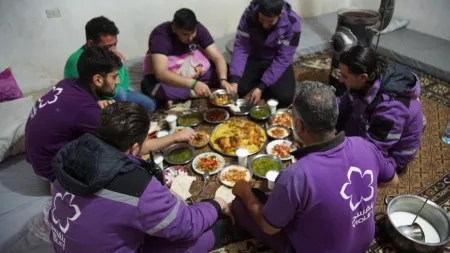After taking a number of medical and first aid courses, Amjad* volunteered in the ambulance team at Violet, one of CARE’s Syrian partner organizations in Northwest Syria. He is now studying at the College of Nursing at the University of Aleppo. “As an ambulance team, 24/24 is the number of hours we are ready to help a person in need. We expect to respond to the call of duty at any moment,” Amjad says.
In the holy month of Ramadan, when Muslims fast from dawn till dusk, most employers reduce working hours so that people who are fasting can get some rest before they break their fast at sunset. The Iftar meal is the main, and sometimes only, meal of the day. Yet, Amjad and the ambulance team members cannot take a break or rest in Ramadan, like other employees so, while the lives of other fellow Syrians are at stake.
Amjad tells us that medical emergencies increase during Ramadan because some people are unable to tolerate fasting, which puts additional pressure on the team. “Currently, there is an increase in cases among diabetics and neurological patients, due to fasting. Sometimes, we transfer 20 emergency cases to hospitals and healthcare centers in one day, which is immensely demanding.”
In Syria and the region, Ramadan is a time for families and friends to visit each other for Iftar and re-connect with extended family members, but the ambulance team spends Iftar at their workstations, ready to respond to emergencies. Although they are away from their families, the team of first line responders have become each other’s family – they prepare Iftar together, chat, and laugh, as they break their fast.
“It is a blessed month and while working, we feel this blessing. We have a special Ramadan atmosphere here in the workstation. We work as one team, we respond quickly, and we all cooperate to save lives. When the time for Iftar comes, we help each other prepare food in the station and eat as one family,” says Amjad.
*Name has been changed
What about the pandemic?
Ziad* is another member of the ambulance team. He was displaced from rural Damascus and after taking courses in first aid and disaster management, he volunteered with the team as an Operating Room Officer. He responds every day to emergency reports and supports the team’s movements. “I receive emergency calls all day through the operating room; we are in a daily race against time to save lives,” Ziad says.
Recently, the daily number of positive coronavirus cases has increased, which concerns Ziad. “We are afraid of the second wave of the pandemic. In the first wave, many Syrian families who have suffered so much loss during the conflict, had to endure more loss, especially of elderly family members. As an ambulance team, our mission is to be alert around the clock. We cannot directly diagnose coronavirus cases, so we have to deal with every patient as a suspected positive case,” he says.
*Name has been changed.
